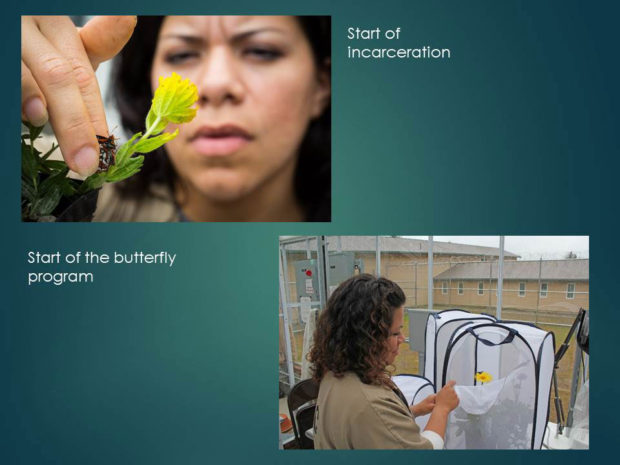Text by Erica Benoit, SPP Special Projects Manager
In my final weeks working with the Sustainability in Prisons Project, I was lucky enough to interview Susan Christopher, another amazing former SPP Butterfly Technician who actually worked alongside Nichole Alexander during her time at the Mission Creek Corrections Center for Women (MCCCW). Susan and I spoke about her experience in the SPP program, the impact she has had on other women struggling with incarceration and/or addiction, and her considerable community involvement.

Susan Christopher (right) assists another crew member in the Taylor’s checkerspot butterfly program. Photo by Keegan Curry.
Susan’s time in the Taylor’s checkerspot butterfly program represents an exceptional case in which an incarcerated person remained employed in a program for more than 3 years. This opportunity to work with the species for four total breeding seasons meant she gained extensive experience and skills that have contributed to the program’s long-term success. In particular, she and other technicians at the time developed tracking mechanisms that impressed program partners like the Washington Department of Fish and Wildlife. Some of her other accomplishments in the program include giving a presentation to 40 biologists, taking a field trip to see the butterflies in the wild at the Glacial Heritage Preserve, and being interviewed by PBS News Hour about the program.

Susan explains the data tracking systems used in the butterfly program in front of the camera for the PBS News Hour Special. Photo by Kelli Bush.
Susan emphasized the positive impact that being in the SPP butterfly program had on her. She said, “It’s such an amazing program…what it does for our self-esteem, giving us a chance to prove ourselves again, to be trusted and appreciated. To me, it was the most important job in the institution.”

Susan Christopher shows off a Taylor’s checkerspot butterfly to SPP Staff, Emily Passarelli. Photo by SPP Staff.
It was clear from our interview that Susan also tends to have a big impact on the communities around her, whether that is in prison or her outside community. For instance, she served as a peer mentor in prison for women while they were experiencing crisis. She also volunteered in MCCCW’s clothing closet program, which provides professional clothes to women preparing to take their next steps into society. While incarcerated, she taught yoga to other incarcerated women as a therapeutic outlet. Since her release from prison, she has continued this practice with individuals who are in treatment for issues related to addiction. She also shares her story of overcoming her own addiction problems to women’s groups and church groups as a way to own her truth and give people hope.
In addition to these meaningful contributions, Susan has also dedicated her time to providing fun outlets for her community of Bremerton, Washington. While the pandemic has put a damper on many social activities, Susan wanted to find safe ways to connect with her community. With the support of city officials, she has organized numerous family friendly cruise nights and car shows around the area. You can learn more about those events by visiting the Cruisin Bremerton Facebook group.

A still of Susan Christopher welcoming visitors to a car show on September 4, 2020. Video by Canalside Photography and Stan Young.
All in all, Susan told me that over time, she realized her purpose and reason for being in prison was to make a difference in others’ lives. In total, Susan had 57 different roommates while incarcerated. For these women and hundreds of others, she has served as part of their support network both during and after incarceration. Many of them still reach out to her today to tell her how her journey has been an inspiration to them.

Susan Christopher behind the camera photographing cars at a car show. Photography has always been a passion of hers and with some encouragement from others, she has started to sell some of her work. Photo by Everett Allison.
Speaking of her journey since incarceration, Susan feels her successes are on the quiet side, but that is how she likes it. She appreciates getting messages and hugs from those who she has impacted. She said she now feels like, “I am worthy, and I do have a place in this world…It may not be standing up and winning awards, but I have a certain satisfaction now that I’ve never had before. People are watching me, looking up to me, and they appreciate me.” We at SPP see you and so appreciate you, Susan.














 by Kristina Faires, SPP Program Enhancement Coordinator
by Kristina Faires, SPP Program Enhancement Coordinator







